#regarding jerusalem
Text
Incredibly grateful for God’s patience with me this month - with my hesitance regarding my calling and asking for further clarification, it just so happens that a speaker from CRS is coming to the campus Catholic organization meeting tonight.
#catholic#tower of babble#catholic relief services#‘God give me a sign’ *sends me someone from a specific reputable organization with ties to where I’m feeling called* thanks dad :]#idk if they personally have worked in the Jerusalem and West Bank projects but it feels like a step in the right direction#to get in contact with them after they speak today regarding opportunities there
5 notes
·
View notes
Text
US Christian Fundamentalists: Unconditionally Supports Israel
Israel Backed US Lobbies: Passes a law that basically banned New Testament
US Christian Fundamentalists:

#for context the US Recently passed new laws regarding antisemitism which not only makes any criticism against Israel illegal#It also basically makes the part of the bible regarding Jesus' death a hate speech against Jewish people#which is so fucking funny to me#Because conservative bible humpers are the most pro-israel even though they hate ordinary Jewish people to distract them from actual problem#And Israel just backstabs their core belief#Although israel also basically throws the Hasidic Jewish which is the most religiously orthodox group and actually anti-israel under the bus#palestine#free palestine#gaza#free gaza#current events#israel#jerusalem#news on gaza#tel aviv#war on gaza
0 notes
Text
Hey wanna hear something strange?
In winter, around Christmas, unsurprisingly, Mormons lose their minds, and let me tell you some of how
Night in Jerusalem, where we decorate the gym to look ‘middle eastern’, and everyone wears shawls, and we walk around with the lights off and the room Illuminated with fake candles. There was a big barrel of water decorated like a well that we ladled water into cups from, and we played dreidel, and people would bring baskets and spices n shit to get a market feel. I don’t remember whether there was a nativity at that or not, but it’s worth mentioning that the actors for nativities are chosen as families and it’s a big honor.
Now where I am, we have a nativity it’s like, in a wooded area, you walk through it and there’s candles on the path, similar aforementioned cosplay of what we imagine Bethlehem must have looked like (it’s fabric and spices), eventually you get to a big wood thing where some young married couple with a baby is pretending to be Mary joeseph and jesus. I think it goes in shifts so that we can all sing a hymn as we look. There’s a light and smoke machine. Then there’s real sheep and donkeys and goats, which along with the hot chocolate are the only reasons to go.
#I don’t like Christmas#sorry I guess#take it up with my#family#exmo#exmormonism#nneewww yooork citayyyy#which is where I lived when we did night in Jerusalem#it’s punch a mormon day#it’s always punch a mormon day#it’s also Tim stoker Tuesday#I am so fucking close to trying to make Tim into an exmo#I just know next to nothing about how the church works/vibes/is regarded in other countries#well I know how it works in Samoa#ask me about Mormonism in Samoa
1 note
·
View note
Note
do you know anything about native wildlife or plant life in palestine? particularly interested in primates because that's always what i'm most interested in but i'd really like to know more about what the animals and plants native to the land are like. what they were like pre israeli occupation and what sort of animal and plant life will need repairing when palestine is free. i hear a lot about the people and the human palestinian culture and it's wonderful but it's difficult for me to find anything regarding nonhuman life and i would like to learn more about it.
Honestly, the topic of Palestinian wildlife and its intersection with colonialism has been something that has increased a lot over the past couple of years. I can't offer anything about primate species (Palestine doesn't have any) but we do have lots and lots of very cool native animals like Gazelle and Caracal and Sand foxes and lots of bats and gerbils and snakes.
The Palestine Wildlife Society actually has a website with lists of all the animals found in Palestine and what level of conservation status they are at (plus the Arabic names): https://www.wildlife-pal.org/en
The Palestinian Central Bureau of Statistics also reported back in 2012 that:
There are about 51,000 living species (flora and fauna) in historical Palestine, constituting approximately 3% of global biodiversity.
In the West Bank and Gaza Strip there are an estimated 30,904 animal species, consisting of an estimated 30,000 invertebrates, 373 birds, 297 fish, 92 mammals, 82 reptiles, and 5 amphibians. Recent studies on birds in Palestine indicated that there are 373 species, which represent 23 Orders, 69 families, 21 Subfamilies, and 172 genera. The country also hosts 2,850 species of plants from 138 families.
And also added in 2014:
Israeli Violations are the main causes of Biodiversity deterioration
Based on 2012 data from ARIJ Research Institute, the Expansion and Annexation Wall has a total length of about 780 kilometers, of which 61% has been completed. The route of the Wall has isolated 680 km2 of Palestinian land between the Wall and the Green Line, comprising approximately 12.0% of the West Bank. This land comprises about 454 km2 of agricultural, pasture land and open areas, 117 km2 that were confiscated for Israeli settlements and military bases, 89 km2 of forest and 20 km2 Palestinian built-up land.
During 2013, more than eight thousand dunums of land were confiscated from Palestinians and more than 15 thousand horticultural trees were destroyed, causing considerable damage to the Palestinian environment and biodiversity.
The Israeli settlements and military bases also contribute in the biodiversity deterioration since there were 482 Israeli settlements and military bases in the West Bank at the end of 2013 contained around 563,546 settlers at the end of 2012.
Climate change is the most important natural factor that contributes to biodiversity degradation in Palestine. More animal and plant species have become under serious threat of becoming rare due to low rainfall, high temperatures, and the changing characteristics of the four seasons, in which drought is creeping into winter and spring.
The mountain Gazelle is currently endangered and this is due mostly to the building of roads and fences as well as predation and collisions with cars (the article also references the building of housing units in Mitzpeh Nafto'ah, which one of the areas where, in 2012, Israeli developers wanted to 'build up Jerusalem'). As of 2015, there were around 2,000 identified Gazelles within the Palestinian territories and historic Palestine. The mountain Gazelle look like this:

There have also been efforts for plant conservation in Palestine like the Iris Atrofusca, which has an extremely fragile population and is found almost exclusively within Palestine - a botanical garden was established for this particular Iris in the North Eastern Slopes of Palestine and in 2021, 120 clones of Iris Atrofusca were planted. Here is what they look like:

(also very interesting, sheep do not eat it!)
Probably most famous is the extinction of the Palestinian Crocodile, the last rhetorical circulation to 1935. Elizabeth Bentley wrote a great piece on it, you can read the full PDF on the Institute of Palestine Studies website or the edited (with permission) one published to Science for the People Magazine, I copied a segment from the latter here:
Colonial zoologists and collectors saw and appreciated Palestine’s bountiful plants and animals as objects of scientific inquiry. This scientific appreciation was inextricable from imperialist ambitions and the drive for profit. There were no wildlife protection laws in Palestine until 1924, which was after crocodiles’ likely regional extinction, and even then, the laws were loosely enforced. Colonial zoologists not only observed and wrote about Palestinian animals in their natural habitat. These zoological works were one of extraction and commodification.
Euphemistically termed processes of “collection” involved a network of human and nonhuman actors, whereby colonial zoologists hunted and killed Palestinian animals, studied them, and transported their remains overseas. Disemboweled, stuffed with wire and flax, and then displayed in glass cases, Palestinian animals were reanimated as spectacles for the viewing pleasure of museumgoers in London and Berlin.
While aligned with the broader trends in colonial zoology, the allure of the last Palestinian crocodile surpassed the confines of scientific inquiry; it adapted a symbolic, even mythical quality. Colonial zoologists’ ongoing speculation about Palestinian crocodile extinction necessitated a degree of willful (or internalized) unknowing about Palestine and Palestinians. Colonial zoologists were heavily dependent on Palestinians’ ecological expertise. Despite this, their writings convey mistrust and condescension toward Palestinians, along with a detachment from how local populations lived alongside Palestinian ecology.
Colonial scientific literature on Palestinian animals frequently perpetuated the racist, historically inaccurate outlook of “science for the West, myth for the rest.” Yet colonialist writings on the last Palestinian crocodile reflected their own symbolic attachments and investment in mythical thinking.
So there is a lot of work to do in regard to animal and plant conservation and several extinct animals I didn't bring up here but It is a deep dive and goes a lot farther than a lot of people consider. The Palestine Wildlife Society has a massive catalog and I hope you look through it!
1K notes
·
View notes
Text
Haaretz did this:
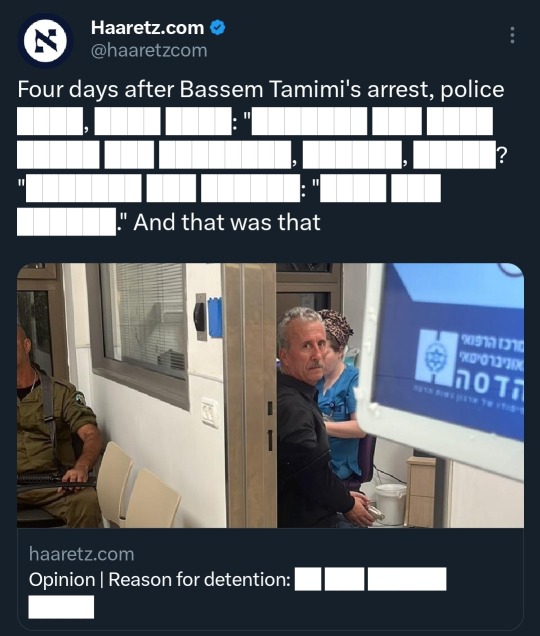
The full thing is under the cut, in case this link is paywalled for other people. The actual text has blocked out portions as well, to highlight what it's like to report on cases of administrative detention.
Highlights:
Like all administrative detention hearings, it was held in-camera, to obscure the fact that detainees' lawyers do their job without access to the facts of the case. Even the few details that are not secret are prohibited for publication. The administrative detention order was approved in full for a period of six months
And
In the past, it was considered, at least officially, a measure reserved for the most extreme of cases. This hypocritical position has always been false, but now there is no longer any need to save face. According to the Israeli army's own data, almost 5,000 arrests were made in the West Bank in the past eight months. These are very conservative numbers, as they don't include the many thousands arrested and released without being indicted.
The data shows that administrative detention, this so-called extreme of extremes, is now the norm. According to Israeli Prison Service numbers, Israel now holds 7016 people who have not yet been convicted in its jails – either awaiting trial or under administrative detention. Of these, 4,299 – more than 60%! – are held without charge or trial. And all that is without saying a single word about the torture, hunger and humiliation to which all Palestinian prisoners held by Israel are subjected these days.
Administrative detention is based on secret suspicions, secret evidence and no charges being brought. To conceal its inherent absurdity, hearings are held in-camera and away from the public eye. As such, even the little that is revealed to the defense remains prohibited for publication.
On the morning of October 29, after a short farewell to his wife Nariman and their kids, Bassem Tamimi left his home in the West Bank village of Nabi Saleh, north of Ramallah, and started heading east toward the Allenby Bridge. He was on his way to visit relatives in Jordan he had not seen in a long time. A little after 11 A.M., Nariman received a message saying, "The secret police asked for me. I'll write when it's over." And then, shortly after 3 P.M., a call: "I am being arrested. They're coming to take the phone. Have to go. Bye."
This, unfortunately, was not Bassem's first encounter with Israeli law. His village, Nabi Saleh, has waged a multi-year campaign of civil resistance against land grabs and settlement expansion. As a prominent activist, he was incarcerated repeatedly for his role as a protest leader, part of Israel's attempt to quell dissent.
In the evening, the phone rang again. The woman on the line introduced herself, saying she lived in Silwan and was currently at the Hadassa hospital in Jerusalem. She then went on to say that Bassem was there, surrounded by soldiers. He was taken there after his blood pressure soared dangerously. Nariman could faintly hear Bassem's voice over the line saying, "I'm fine, don't worry, everything's good." After a few more hours, at night, that same woman sent a picture of Bassem in the ER, undergoing a checkup; his hand bound with ziptie cuffs. That was the last time Nariman heard from him. Save for a single short lawyer visit before Eid al-Fitr in April, no one has been in contact with him since.
Four days after his arrest, police ████, ████ ████: "███████ ███ ████ █████ ███ ████████, ██████, █████? "███████ ███ ██████: "████ ███ ██████." And that was that. Eight days later – the maximum time afforded to the authorities by article 33 of Israel's military law in the West Bank before a detainee must be presented before a judge (who also is a soldier in uniform) – a six-month administrative detention order was issued, which did not suggest any specific allegations, but rather only a very general statement regarding ███████ ██ █ ███████ .
Eleven more days later, the Kafkaesque proceedings of judicial review over the order took place. Some of it was held ex-parte between the soldier-judge and the Shin Bet. Like all administrative detention hearings, it was held in-camera, to obscure the fact that detainees' lawyers do their job without access to the facts of the case. Even the few details that are not secret are prohibited for publication. The administrative detention order was approved in full for a period of six months, until April 28.
Administrative detention, however, is not really bound by the limits of time, and can be extended indefinitely. And indeed, as the six months passed, a new six-month order was signed, citing the same meaningless cause of ██████ ████ █ ██████ ██ █. This time however, and unlike the state of affairs in almost any other administrative detention case, the defense had a pretty good insight into the details of the case. Administrative detention is such a mundane phenomenon in Israeli military courts, that , , , .
A few hours prior to Bassem's arrest, Israeli forces arrested █████ █ ████ █ ██████ ███ █████ █ ████████ ███ ███, Bassem's friend from their days together in Israeli jail at the beginning of the millennium. Then too, under administrative detention. ██████ ███ █████ █ ███ ████ ███ ███ ██████ █ ██ █████ █ ███ █████ ███ ███ █ ███ ███ ████, █ ████ ███ ███ ████ ███ ████ █ █ ███ █████ ██ ██ ██ ██ ███ ████ █ ███ █████ ███ ███ █████ ███ ████ █ ███. █████ ███ ███ █████ ███ █████ █ ███, █████ ███ ███ ███ ███ ███ █████ █ ████ ███ ███ ████ ███ █████? █ █████ ██ ███ ███. ██ ███ ██ ███ █ ██ █████ ███ ███ ██████ ███ █████ █ █████ ███ ███ ██████ ███ █████.
█ ████ ███ ███ ███ █████ ███ █████ █ ████ ████ ███ ███ ████ ███ █████ █ ████ ██ ███, ██████ ███ █████ █ ███ ████ ███ ███ ████ ███ █████ █ ██ ███ ███ ███ ███ ██ ███ ███ █ "██████ ███ ███ ████ ███ ████ █ ██████ ███ ███? █████ ███ █████ █ ████ ███ ███ █████ ███ ████ █ ███████ ███." ███ ██████ ███ ████ █ ███ ███ ███ ██ ███ █████ █ ██████ ███ ███ 25 ███ ██ █████ █ ███████ ████, long after the administrative detention order against Bassem was reviewed and approved by the court, ██████ was unconditionally released.
On his release, ██████ contacted Nariman and told her what had happened, thinking that his release must also mean Bassem should soon follow. This is how the defense learned the details it knows, and not through discovery by the prosecution. Even though there is no gag order on ██████ ██████'s case, discussing its details in conjunction with Bassem's administrative detention is prohibited for publication. Despite everything that was revealed – and that is the nature of administrative detention: there can always be more hidden evidence, secret, almost mystical – Bassem is still being held under administrative detention even now. Almost two weeks after the hearing, ███ █ ██ ██████ ██████ ████████ █████ █ █████ █ █████, the judge partially confirmed the second administrative detention order against Bassem in violation of military law provisions, ████████ ████ █ ███ █ ███████ ███ █ ████████.
Like Bassem, thousands more are held captive by Israel under administrative detention. In the past, it was considered, at least officially, a measure reserved for the most extreme of cases. This hypocritical position has always been false, but now there is no longer any need to save face. According to the Israeli army's own data, almost 5,000 arrests were made in the West Bank in the past eight months. These are very conservative numbers, as they don't include the many thousands arrested and released without being indicted.
The data shows that administrative detention, this so-called extreme of extremes, is now the norm. According to Israeli Prison Service numbers, Israel now holds 7016 people who have not yet been convicted in its jails – either awaiting trial or under administrative detention. Of these, 4,299 – more than 60%! – are held without charge or trial. And all that is without saying a single word about the torture, hunger and humiliation to which all Palestinian prisoners held by Israel are subjected these days.
419 notes
·
View notes
Text
William Blake - an introduction for Good Omens fans
I have sent @neil-gaiman an ask regarding his feelings toward the poet/artist William Blake a couple of times, but no doubt due to the size of the poor man's inbox I haven't received a response. So I did a Google search to see if he's spoken about Blake before, and it did indeed come up with a fair few hits. I think you might enjoy seeing this Twitter post if you haven't already, the painting is from William Blake's illustrations to Paradise Lost.
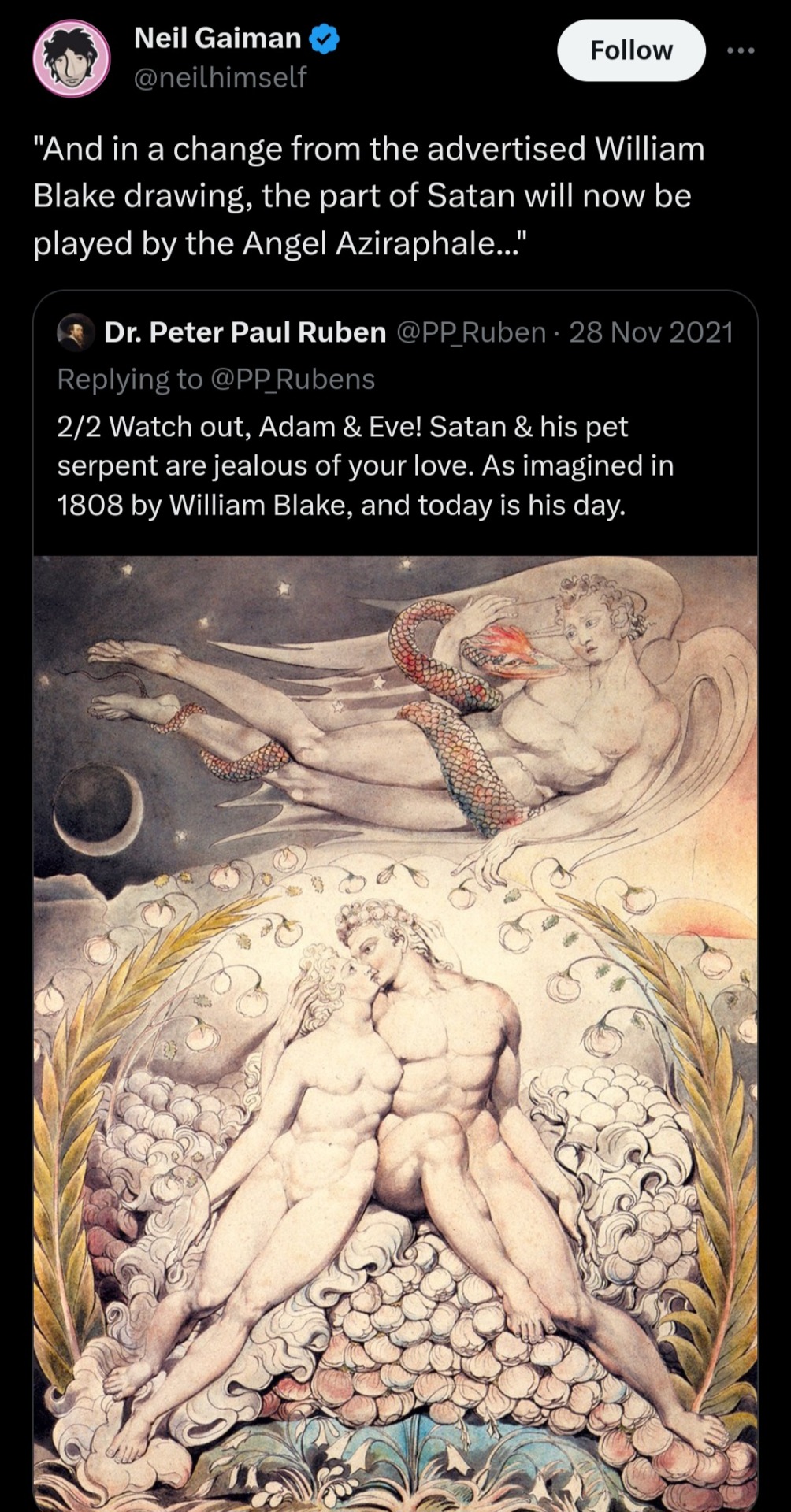
It's not surprising that an author like Neil Gaiman might have an interest in Blake. A visionary from a young age, his imagination was such that he was surrounded by angels made visible in his mind's eye, and he interpreted these visions through poetry, painting and engraving, and self-printed and published many of his own works. This gave him complete freedom to say exactly what he wanted.
Though he had a passionate faith in God, he also had a deep distrust of the church as an institution, and disliked the use of religion as a means of control. This poem from "Songs of Experience" perhaps summarises his feelings best:
"I went to the Garden of Love,
And saw what I never had seen:
A Chapel was built in the midst,
Where I used to play on the green.
And the gates of this Chapel were shut,
And 'Thou shalt not' writ over the door;
So I turn'd to the Garden of Love,
That so many sweet flowers bore.
And I saw it was filled with graves,
And tomb-stones where flowers should be:
And Priests in black gowns, were walking their rounds,
And binding with briars, my joys & desires."
In his poetry there is often an incongruity with the generally accepted religious ideas of what is good and evil, Angel and Demon. In The Marriage of Heaven and Hell (there's a title that should make any GO fan sit up and pay attention) he tells us that "in the book of Job, Milton's Messiah is called Satan", signifying that he feels it is Lucifer/the devil who is the true Messiah of Paradise Lost.
He gives us The Voice of the Devil and Proverbs of Hell, and has Angels being transformed into Demons through enlightenment. He tells us that Jesus broke all of the 10 commandments, yet was still virtuous because he acted according to his own morality rather than rules.
The god-figure of his later works, Urizen, generally comes across as malevolent, seeking to bind and control, whilst Los, the Satan/Messiah figure represents freedom, imagination and creativity.
"Restraining desire" and acting contrary to your own nature seem to be the only real evils for Blake.
He expressed his faith through a love of the world and the beauty in it, summed up in this quote:
"When the Sun rises do you not see a round Disk of fire somewhat like a Guinea? O no no I see an innumerable company of the Heavenly host crying Holy Holy Holy is the Lord God Almighty".
He saw "God" in everything, in all the wonders we have around us, and considered writers/poets and religious prophets as essentially the same, since they both have a connection to the divine, and express it through stories.
It's quite ironic that probably his most famous poem, Jerusalem (the one that starts "and did those feet in ancient times walk upon England's mountains green"), was made into a very popular church hymn, yet it is supposed to be satirical in nature. The poem recounts the myth that Jesus may have visited England in his boyhood, and Blake is expressing his disbelief at that notion and the unworthiness of England.
Did I have a point to all this? Mostly to show my hand as a massive Blake nerd, but also to hopefully demonstrate that there's a lot of common ground between his ideas and those expressed in a show/book like Good Omens, and hopefully to inspire some of you who may not be familiar with Blake to seek him out. In particular I'd recommend The Marriage of Heaven and Hell to any and all.
EDIT: I should have thought to include this, here's Michael Sheen reading a Blake poem. I have the CD this is from, he reads several by Blake, as well as other poets I love ❤️ 😍
youtube
#william blake#good omens#good omens book#good omens 2#good omens s3#neil gaiman#crowley#aziraphale#english literature#literature#poetry#go2#good omens s2#good omens season 2#book omens#michael sheen#Youtube
1K notes
·
View notes
Text
The UN's Official Mission report on Hamas' Sexual Violence in Israel was published
Please take your time to read this.
Israeli \ Jewish victims deserve the same protection as any other women.
The brief version can be read here.
----
***I am not going to include any graphic detailing.
The pattern of Sexual Violence used by Hamas is very clear:
It was one of their key goals and tactics on October 7th.

You cannot say "Female Hostages are treated well. you're lying by saying they're raped" anymore!

Notice how they also said **Children**

Civilians were in fact burned inside their homes

This is also clearly a pattern used by Hamas, as this is just one of many examples they detail.
-Hamas has also burned soldiers alive in their dorms and offices. That is also further detailed in the report.
This is not fake or propaganda
I can't believe I have to write this but this report is an official report (finally) made by the UN's Sexual Violence Office, as part of their yearly report.
They had a 2-week delegation that toured the actual Kibbutzim (turned crime scenes), interviewed eyewitnesses, spoke to families of victims, etc...
___
I do have to say I was mistaken in my earlier post, besides their conclusion, they have also written their recommendations:
...." V. Conclusions
Overall, based on the totality of information gathered from multiple and independent
sources at the different locations, there are reasonable grounds to believe that conflict-related
sexual violence occurred at several locations across the Gaza periphery, including in the form of
rape and gang rape, during the 7 October 2023 attacks. Credible circumstantial information,
which may be indicative of some forms of sexual violence, including genital mutilation,
sexualized torture, or cruel, inhuman and degrading treatment, was also gathered.
22
With regards to the hostages, the mission team found clear and convincing information
that some hostages taken to Gaza have been subjected to various forms of conflict-related sexual
violence and has reasonable grounds to believe that such violence may be ongoing.
The mission team was unable to establish the prevalence of sexual violence and
concludes that the overall magnitude, scope, and specific attribution of these violations would
require a fully-fledged investigation. A comprehensive investigation would enable the
information base to be expanded in locations which the mission team was not able to visit and to
build the required trust with survivors/victims of conflict-related sexual violence who may be
reluctant to come forward at this point.
Regarding the occupied Palestinian Territory, while its scope did not extend to
verification, the mission team received information from institutional and civil society sources as
well as through direct interviews, about some forms of sexual violence against Palestinian men
and women in detention settings, during house raids and at checkpoints. Though the mission
team did not visit Gaza, the Office of the SRSG-SVC will continue to monitor the situation for
any relevant allegations of CRSV in the context of the ongoing hostilities. The relevant UN
entities present in the occupied Palestinian Territory will provide UN-verified information for
reporting to the Security Council on allegations of CRSV, which will be complemented by the
information obtained by the mission team.
VI. Recommendations
The mission team makes the following recommendations:
a) Continue to encourage the Government of Israeli to grant, without further delay, access to
the Office of the High Commissioner for Human Rights and the Independent
International Commission of Inquiry on the occupied Palestinian Territory, including East
Jerusalem and Israel, to carry-out fully-fledged investigations into all alleged violations
that would deepen the preliminary findings contained in the present report.
b) Urge Hamas and other armed groups to immediately and unconditionally release all
individuals held in captivity and to ensure their protection including from sexual violence,
in line with international law.
c) Call on all relevant and competent bodies, national and international, to bring all
perpetrators, regardless of rank or affiliation, to justice based on individual, superior and
command responsibility, in accordance with due process of law and fair trial standards.
d) Encourage the Government of Israel to consider signing a Framework of Cooperation
with the Office of the SRSG-SVC to strengthen capacity on justice and accountability for
CRSV crimes as well as security sector engagement, training, and oversight to prevent
and address CRSV.
23
e) Strengthen the capacity of the United Nations to monitor and report on incidents, patterns
and trends of CRSV in both Israel and the occupied Palestinian Territory through the
establishment of the Monitoring, Analysis and Reporting Arrangements on CRSV
(MARA), convened by dedicated technical specialists, namely Women’s Protection
Advisors (WPAs), deployed to the region to ensure prevention, protection and
coordinated multi-sectoral assistance to survivors/victims.
f) Encourage relevant actors to uphold information integrity and ethical, trauma-informed
representations of conflict-related sexual violence, including by respecting and
safeguarding the dignity and identity of survivors/victims and witnesses of sexual
violence, as sensationalizing headlines, media pressure and scrutiny, exposure of identity,
political instrumentalization and pressure, and/or fear of reprisal can result in the
suppression, silencing and discrediting of survivors/victims and witnesses, further
compound trauma and increase the risk of social stigmatization.
g) Urge all parties to the conflict to adopt a humanitarian ceasefire, and to ensure that
expertise on addressing conflict-related sexual violence informs the design and
implementation of all ceasefire and political agreements and that the voices of women
and affected communities are heard in all conflict resolution and peacebuilding processes....."
Israelis have been repeatedly saying all of this for months now, while you deny it. I've personally had people tell me it's all "fake propaganda". You should all be ashamed.
I am infuriated at the fact that for 5 months, our evidence and word isn't enough for Anti-Zionists. Here is some undeniable proof for you.
Believe Jewish Women.
#believe jewish women#me too unless you're a jew#feminism#israel#jewish#israeli#jewblr#israel palestine conflict#gaza strip#ישראל#טאמבלר ישראלי#human rights#feminist#israel palestine war#gaza#anti semitism#hamas#rafah#current events#middle eastern history#middle east#ישראלי#gaza strikes#free gaza#jumblr#columbia university#Iran#hamas is isis#עברית#antisemitism
426 notes
·
View notes
Text
Spain: We recognize an independent Palestinian state, even though it's an anti-peace move, and even though we also support their claim that they're occupied, not independent!
Israel: Okay, in that case, why should your diplomats serve Palestinians from our sovereign territory in Jerusalem? No more.
Spain: What? Then we will punish Israel by moving some of our Spanish diplomats from Israel to a new embassy in Ramallah!
Spanish workers of Spain's embassy in Tel Aviv and its consulate in Jerusalem: The fuck! We're not willing to live under the Palestinian Authority's rule! We don't trust that we'll be safe!
Spain: ...So our only way of opening an embassy in Ramallah is to recruit new staff, which would require additional budget dedicated specifically to this? Huh. Hmmmm. Okay, forget the whole thing.
Spain: ...Also, we're not going to take in any Gazans as refugees, like we did for Ukrainians, and please stop calling what's happening in Gaza a genocide, not because we recognize the truth that it isn't one, we just don't wanna be forced to accept refugees from there. But we totally helped the Palestinians with this symbolic, empty recognition gesture that doesn't promote peace at all!
This would be hilarious, if it weren't so stupid and tragic.
(for all of my updates and ask replies regarding Israel, click here)
#israel#israeli#israel news#israel under attack#israel under fire#israelunderattack#terrorism#anti terrorism#antisemitism#hamas#antisemitic#antisemites#jews#jew#judaism#jumblr#frumblr#jewish
375 notes
·
View notes
Text
Btw, reminder for you all to absolutely dismiss any opinion from Conservative Christians regarding the occupation. Christians Zionists are not like any other Zionist and are more interested in mass converting the Jewish people and establish a Christian theocracy in the Holy land. When you see them preach about how important it is for USAmericans to support Israel, that's them. When you see them preach about "Yeshua" in the streets of Jerusalem, that's them. They are all part of a doomsday cult and hold absolutely no regard for Jewish people and Palestinians whether they're Muslim or Christian.
623 notes
·
View notes
Text

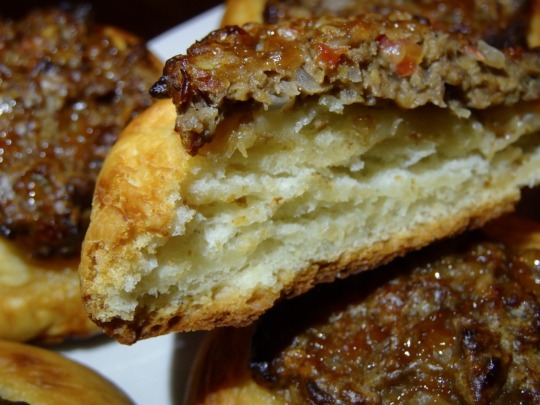
[ID: First image is a close-up on a plate of small flatbreads topped with ground ‘meat’; second is a cross-section of one of the breads. End ID]
صفيحة فلسطينية / Safiha falastinia (Palestinian topped flatbread)
Etymology and origins
صَفِيحَة (“ṣafīḥa”), also transliterated “sfiha” and “sfeeha,” is a flatbread eaten in Palestine, Lebanon, and Syria, comprising a yeasted dough topped with a filling made from ground lamb or beef, spices, and chopped aromatics and vegetables. It may also be called “اللَحْم بالعَجِين” (“al-laḥm b al-‘ajīn,” “meat with dough”)—this phrase is the source of the Turkish “lahmacun” and the Armenian “Լահմաջո” (“lahmadjo”), which describe a closely related dish.
The word “صَفِيحَة” literally means “thin plate” or “sheet”; it comes from the root ص ف ح (ṣ f ḥ), which produces words related to flatness. Compare for example “صَفَّحَ” (“ṣaffaḥa”) “to flatten,” “صَفْحَة” (“ṣafḥa”) “page,” and “صَافَحَ” (“ṣāfaḥa”) “to shake hands.” This term has been borrowed into Brazilian Portuguese as "esfirra" or "esfiha," when the flatbread was brought to Brazil by Levantine immigrants—mostly Christians—beginning in the 1890s. Today, esfiha has been naturalized as a "'typical' Brazilian bar food"; it is said that the typical resident of São Paulo is a "Japanese who speaks Portuguese with an Italian accent while eating an esfiha."
In English, lahmacun (also transliterated "lahmajoun") is sometimes called "Armenian pizza." Similarly, it may be called "صفيحة الأرمنية" ("safiha al-'armaniyya"), "Armenian safiha," in Palestine, indicating that it is regarded as a borrowing from the local Armenian immigrant community. In Armenia, lahmadjo is a very thin, soft flatbread typically topped with beef or lamb, tomatoes, tomato paste, bell peppers, onion, garlic, parsley, red chili paste, and black pepper. With Palestinian safiha, lamb is the typical choice of meat; the dough may be thicker, and enriched with the addition of milk, milk powder, or yoghurt; bell peppers are ommitted; and fried pine nuts may be added. Palestinian restaurateur Nassar Odeh remembers lahmadjo being served in Jerusalem's Old City decades ago; he says that "Armenian dishes" such as this have become "part of the Palestinian culture."
Though the Arabic-derived "lahmadjo" and related terms may be heard, [1] the most common Armenian-language name for this dish is "լոշմիս" ("loshmis")—presumably from "լոշ" "losh" "lavash, thin bread" + "միս" "mis" "meat." Some Western Armenian variations on the name reverse this order (meat-dough, rather than dough-meat): "մսաշոթ" ("msashot"), from "մսա" "msa" "meat" + "շոթ" "shot" "thin bread"; and "մսալոշ" ("msalosh"), from "մսա" "msa" "meat" + "լոշ" "losh" "thin bread."
The dish
A common part of everyday Palestinian cooking, صَفَائِح ("ṣafā'iḥ"; plural of "ṣafīḥa") are often eaten as a snack or a portable lunch. They may also be served as a مَزَّة ("mazza"; "appetizer") for عِيد ("'īd"; "feast," "holiday"; often transliterated "Eid") or Christmas.
Safa'ih are shaped into pinwheels in the port city of يَافَا ("Yāfā"; often transliterated "Yaffa" or "Jaffa"), stuffed with ground meat or spinach. In the Bethlehem region the topping is often mixed with tahina, as well as vinegar or lemon juice, and perhaps pomegranate molasses. Other versions of the meat topping omit tahina and vinegar, and are more tomato-heavy instead.
This recipe is for Bethlehem mazza-style safa'ih, with thick crust that's crisp on the outside and light and fluffy on the inside. Vinegar and pomegranate molasses provide a bright, slightly fruity lift to the topping, while tahina grounds it with a toasty, nutty aroma. Black pepper, allspice, and a green chili pepper add complexity and heat.
[1] There is a proliferation of possible spellings for "lahmadjo" in Armenian, which would indicate that it is a loanword (probably via Turkish, ultimately from Arabic). These spellings include "լամաջո" ("lamadjo") [common]; "լահմաջո" ("lahmadjo"); "լահմաջու" ("lahmadjou"); "լահմաջոն" ("lahmadjon"); "լահմաջուն" ("lahmadjoun") [literary; uncommon]; "լահմաջին" ("lahmadjīn"); and "լահմաջի" ("lahmadjī") [rare]. The letter "ջ" is pronounced as "dj" (IPA: [d͡ʒ]) in Eastern Armenian and a "tch" (IPA: [t͡ʃʰ]) in Western Armenian (timestamp: 40:33).
Support Palestinian resistance by donating to Palestine Action’s bail fund; buying an e-sim for distribution in Gaza; or donating to help a family leave Gaza.
Ingredients:
Makes 24 small safa'ih. Serves 24 as an appetizer, or 6-7 as a main dish.
For the dough:
5 cups (600g) white flour
1 cup (230g) non-dairy yoghurt (لبن رائب) (I used soy)
1/2 cup (125 ml) olive oil
1 1/2 Tbsp (15g) dry yeast
1/2 Tbsp (4g) kosher salt
1 tsp (5g) sugar
A scant cup (220g) of water
A more "everyday" preparation of this dish might make larger, flatter safa'ih out of a dough without dairy. This holiday variant includes yoghurt and makes smaller, fluffier safa'ih; but the yoghurt may be omitted (or milk or milk powder may be added) without injury, and the flatbreads can be made any shape you like.
Leila al-Haddad writes that, in Gaza, white flour used to be eaten as a treat and for special occasions before it later came to replace whole wheat white flour in many kitchens.
For the topping:
500g ground beef substitute (as a replacement for minced lamb)
1 medium tomato, minced
1 medium onion, minced
1-2 green chili peppers, minced
2 tsp kosher salt (1 tsp table salt)
3/4 tsp black pepper
3/4 tsp allspice; or Palestinian 7-spice / mixed spices (بهار مشكل)
1/4 cup white tahina
2 Tbsp pomegranate molasses
2 Tbsp white vinegar, or lemon juice
For a tomato filling, omit the tahina and vinegar, and instead use 2 Tbsp tomato paste; or 8 diced or puréed tomatoes, cooked down.
Instructions:
For the dough:
1. Combine all dry ingredients in a large mixing bowl.
2. Make a well in the center and add in the yoghurt, olive oil, and water. Mix them together and then combine them with the rest of the dough. Add water or flour as needed to obtain a soft, slightly tacky dough.
3. Knead the dough on a clean surface for 5-10 minutes, until it bounces back when pressed. Allow to rise, covered, in an oiled bowl for 1-2 hours, until doubled in size.
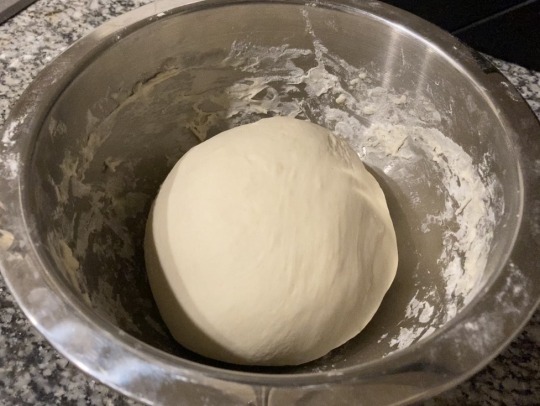
For the filling:
1. Mince vegetables, or run them through a food processor. Mix all filling ingredients together.
To assemble:
1. Divide dough in half, and then half again; roll out each quarter of the dough into a cylinder and cut it into six equal pieces.
2. Roll each piece of dough into a ball between your hands, and then flatten it into a disc about 1” (2 1/2 cm) high and 3” (8cm) wide. Place on a baking sheet prepared with parchment paper, leaving an inch of space between each circle.
3. Press the center of each dough circle down to create a crust around the edge. Add a few spoonfuls of filling to the center of each safiha and press flat.

4. Bake safa'ih in the middle of an oven at 450 °F (230 °F) for 25-30 minutes, until crust is golden brown.
Serve as an appetizer alongside vegetable salads, pickles, olives, &c.

434 notes
·
View notes
Text
Why are there Palestinian refugees?
In the months before the British abandoned its mandate & Israel declared independence, civil war raged as Arab factions tried to prevent the Jewish state from being born.
Of course, had the Arabs agreed to the UN's partition plan, they would have had yet another state & there would have been no war in 1948.
But their goal was not another Arab state; it was to ensure there would be no Jewish state.
Meanwhile, 5 #Arab armies amassed on the borders & waited for the British to leave so they could push the Jews into the #Mediterranean Sea.
As Secretary-General of the Arab League Azzam Pasha put it on the day of the Arab #invasion:
"This will be a war of extermination & momentous massacre, which will be spoken of like the Mongolian massacres and the Crusades."
Or as the then war #criminal & fugitive #Nazi Grand Mufti Amin al-Husseini put it during the invasion:
"Murder the #Jews. Murder them all!"
But before the invasion began, & starting as early as Dec 1947, Arab officers began ordering Arab residents of specific villages to flee.
Their reasoning? Arab citizens not involved in active fighting could only: (1) "treacherously" abide the creation of a the Jewish state &/or even become citizens of same; or (2) be in the way of Arab #military deployments & potentially get caught in the crossfire.
And so, for example, on this day (March 8) in 1948, the Arab Higher Committee ordered all Arab women, children & elderly to leave Jerusalem. The order continued, "Any opposition to this order ... is an obstacle to the holy war ... & will hamper the operations of the fighters in these districts.”
In fact, the Arab Higher Committee ordered the evacuation of dozens of Arab villages between April & July of 1948 (see photo of Arab citizens fleeing below).
Meanwhile, on April 19, 1948, Jewish forces secured Tiberias, which had a population of ~6,000 #Arabs - all of whom chose to leave. In fact, they left under British military supervision.
The Jewish Community Council immediately issued a statement regarding Tiberias' Arabs:
"We did not dispossess them; they themselves chose this course ... Let no citizen touch their property."
At around this same time, in early & mid-April of 1948, an Arab faction led by Fawzi al-Qawukji was attacking Haifa & attempting to take the city. Then, rumors spread among Haifa's Arab community that Arab air forces were about to bomb the city & ~25,000 of Haifa's Arabs fled.
As U.S. Consul-General in Haifa Aubrey Lippincott noted on April 22, 1948: "local mufti-dominated Arab leaders ... [urged] all Arabs to leave the city, & large numbers did so."
On April 23, 1948, however, #Jewish forces fought back the Arab attack & retook Haifa.
Three days later, on April 26, 1948, a British police report from Haifa noted:
"[E]very effort is being made by the Jews to persuade the Arab populace to stay and carry on with their normal lives, to get their shops and businesses open and to be assured that their lives and interests will be safe."
What were some of those "efforts?"
Israel's first Prime Minister, David Ben-Gurion, sent future Prime Minister Golda Meir to Haifa with the direct instructions to "persuade the Arabs to stay."
Ms. Meir was unsuccessful, however, as Haifa's Arabs told her they feared that if they stayed, they would be branded "#traitors."
And so, another ~25,000 of Haifa's Arabs fled.
Stop me if you've heard this one before, but despite facts on the ground, Arab leaders at the #UN began demanding the end to a fake "#massacre."
Specifically, #Syria's UN Ambassador Faris al-Kouri, said the Jewish victory at Haifa was a "massacre" that provided "evidence that the '#Zionist program' is to annihilate Arabs within the Jewish state if partition is effected."
The #British were still on the ground, however, & the British Ambassador to the UN, Sir Alexander Cadogan, told the UN the very next day both that the fighting in Haifa had only begun as a result of "continuous attacks by Arabs against Jews" & that the "reports of massacres & deportations [were] erroneous."
Meanwhile, after Israel declared its independence & was invaded by five Arab armies, the newly established #IDF issued an Order on July 6, 1948, making it clear that non-combatant Arab civilians were not to be harassed or expelled, nor their villages touched.
But the Arabs were being given a very different message.
#Iraqi #PrimeMinister Nuri Said announced:
"We will smash the country with our guns & obliterate every place the Jews seek shelter in. The Arabs should conduct their wives & children to safe areas until the fighting has died down."
This used to be known. In fact, Arab leaders for years after the war had no qualms about repeating it.
For example, Syrian Prime Minister Haled al Azm later wrote:
"Since 1948, we have been demanding the return of the #refugees to their homes. But we ourselves are the ones who encouraged them to leave. Only a few months separated our call to them to leave & our appeal to the UN to resolve on their return."
Similarly, #Jordan's King Abdullah wrote:
"The tragedy of the #Palestinians was that most of their leaders had paralyzed them with false & unsubstantiated promises that they were not alone; that 80 million Arabs & 400 million #Muslims would instantly & miraculously come to their rescue."
Similarly, Edward Atiyah, Secretary of the Arab League Office in #London wrote:
"This wholesale #exodus was due partly to the belief of the Arabs, encouraged by the boastings of an unrealistic #Arabic press & the irresponsible utterances of some of the Arab leaders that it could be only a matter of weeks before the Jews were defeated by the armies of the Arab States & the #Palestinian Arabs enabled to reenter & retake possession of their country.”
Even as the war still raged on Aug 16, 1948, the Arab #Greek Orthodox Catholic Bishop of the Galilee told #Beirut newspaper Sada al-Janub:
“The refugees were confident their absence would not last long, & that they would return within a week or two ... Their leaders had promised them that the Arab Armies would crush the ’Zionist gangs’ very quickly & that there was no need for panic or fear of a long exile.”
A few months later, on Feb 19, 1949, the Jordanian newspaper Filastin confirmed:
"The Arab States encouraged the Palestine Arabs to leave their homes temporarily in order to be out of the way of the Arab invasion armies."
Even many of the Palestinian Arab refugees themselves admitted their reasons for leaving.
For example, on June 8, 1951, Habib Issa admitted to #NewYork Lebanese newspaper Al Hoda:
"Azzam Pasha assured the Arab peoples that the #occupation of Palestine & #TelAviv would be ... simple ... He pointed out that they were already on the frontiers & that all the millions the Jews had spent on land & economic development would be easy booty, for it would be a simple matter to throw Jews into the Mediterranean ... Arabs of Palestine [were told] to leave their land, homes & property & to stay temporarily in neighboring fraternal states, lest the guns of the invading Arab armies mow them down.”
Similarly, Asmaa Jabir Balasimah recalled being told by Arab leaders to "evacuate the village & return after the battle is over," & that she & others in her village left all their possessions behind "based on the assumption that we would return after a few hours."
Again, however (& most importantly), had the Arabs agreed to Partition or even agreed to negotiate different borders with Zionist leaders who begged Azzam Pasha to make any counteroffer instead of invading with #genocidal intent, there would never have been a single Palestinian #refugee.

276 notes
·
View notes
Text
Full article under the cut
"The United Nations’ top court on Monday heard a final day of arguments on the legality of Israel’s decades-long occupation of Palestinian territories, proceedings that have added pressure to Israel at a time when attention focuses on the war in Gaza.
The hearings, which began last Monday, were the first time that the court, the International Court of Justice, had been asked to detail the legal consequences of Israel’s “prolonged occupation, settlement and annexation” of the territories, including the West Bank and East Jerusalem, since 1967 — issues that have been the subject of years of debate and resolutions at the United Nations. The U.N. General Assembly asked the court to give an advisory opinion.
Judge Nawab Salam, the president of the court, ended the hearings saying that the judges’ conclusions would be announced at a public hearing. The conclusions were expected to take at least six months, lawyers at the court said."
The sessions, held at the Peace Palace in The Hague, heard from representatives of more than 50 countries, an unusually high number for the court. Most sided with the Palestinian representatives, who argued that Israel had long abused Palestinian rights with impunity and denied their right to self-determination.
“Israel has arrogated to itself the right to decide who owns land, who may live on it, how it is used,” Philippe Sands, a member of the Palestinian delegation’s legal team, argued last week. “It has confined Palestinians to enclaves,” he added, and broken up its territory with hundreds of settlements “regarded as a permanent part of Israel.”
Israel did not appear at the hearings, but, in a written submission, it rejected the questions raised by the proceedings as biased.
The proceedings have been given urgency by Israel’s war against Hamas in the Gaza Strip. Health authorities in Gaza say that Israel’s military campaign has killed more than 29,000 people, the majority civilians, and provoked what the United Nations says is a humanitarian disaster.
Since the war began, Israeli forces have also detained hundreds of Palestinians in West Bank raids. Deadly violence against Palestinians by Israeli settlers has increased and Palestinian attacks on Israelis have also risen.
A few speakers at the court, including those from the United States, Britain and Hungary, have sided with Israel. On Wednesday, a State Department official argued before the court that Israel’s policies toward the Palestinians were determined by its “very real security needs.”
But Israel’s campaign in Gaza has presented a dilemma to President Biden’s administration, which has continued to supply Israel with military aid while expressing growing concern over the treatment of Palestinians.
Mr. Biden has said that Prime Minister Benjamin Netanyahu’s government has been “over the top” in its conduct of the war in Gaza. And on Friday, Secretary of State Antony J. Blinken said that the American government was reversing a Trump administration policy and would now consider new Israeli settlements in Palestinian territories to be “inconsistent with international law.”
#icj hearing#palestine#6 months is bs wtf#....so theyre complicit and every institution we have is worthless and needs to be overthrown. cool.
281 notes
·
View notes
Note
Hi! Can I pls request headcanons about being King Baldwin IV's wife? Thank you ❤️❤️
Heyyy thank you for the request ❤️ sorry this took long, enjoy!
❗THIS IS ABOUT BALDWIN IV FROM KOH, NOT THE ACTUAL HISTORICAL FIGURE❗
Baldwin IV's wife
(headcanons)

- Dear Y/N, from the day that the ring would be put on your finger and the vows spoken, you would be SPOILED. Gifts, flowers and rare bottled aromas from various civilizations all over the world would be given to you from your husband every day.
- This was because he wanted to show you how much he appreciated you and the love you have for him, but also because one of his love languages is gift giving. For example, if one day he wore a new necklace or perhaps a new pair of gloves and you complimented them, they would be yours the second after.
- He felt the love in your relationship and was aware that you'd never leave him however he was still terrified of you running away with another "better-looking" and richer man. You would oftentimes wake up in the middle of the night to find him breathing heavily and sweating because of a nightmare he had in regards to that.
- That's why reassuring him about such things plays a big role in the marriage. He is a strong and intelligent man, but sometimes his insecurities get the best of him.
- One of his love languages is also physical touch. When sitting at meetings with people of power and discussing problems, he would hold your hand under the table or put his hand on your thigh.
- He also relaxed around you even more than before, walking around without his mask, only in a veil.
- It is also important to mention that the people love you! Women look up to you and your loveliness, and men look up to your intelligence. You often receive compliments about being an amazing Queen to the people of Jerusalem, from nobles and so-called peasants.
- Your sister-in-law Sibylla ADORES you!
- Before she met you, she was filled with worry about the woman he was going to marry. She loved her brother and wanted the best for him, she wanted him to marry a woman with grace and dignity. So once you two got to know each other better, a huge weight was lifted off her chest.
- You and Baldwin would spend a lot of time together, whether that be him and you just laying in bed and talking for hours on end, or you watching him write letters for different kings and draw new ideas, admiring him silently.
- When you learned that he was French, but had never visited France you made sure that he would get to see it. You planned a trip for his birthday, which wasn't easy due to his condition however you made it work in the end.
- You made sure the best physicians in the country would accompany you throughout the journey to and through France, and once Baldwin learned of this surprise you had for him, he was over the moon.
- It was on this trip that he realized he didn't fall in love and marry just any woman, but a lifelong partner whom he could be proud of.
THE END.
494 notes
·
View notes
Text
September 2023 witch guide
September 2023 witch guide
Full moon: September 29th
New moon: September 14th
Sabbats: Mabon September 23rd
September Harvest Moon
Also known as: Autumn moon, falling leaves moon, song moon, leaves turning moon, moon of brown leaves, yellow leaf moon, wine moon & Full corn moon
Element: Earth
Zodiac: Virgon& Libra
Animal spirits: Trooping Faeries
Deities: Brigid, Ceres, Ch'ang-o, Demeter, Freya, Isis & Vesta
Animals: Jackal & snake
Birds: Ibis & sparrow
Trees: Bay, hawthorn, hazel & larch
Herbs/plants: Copal, fennel, rye, skullcap, valerian, wheat & witch hazel
Flowers: Lily & Narcissus
Scents: Bergamot, gardenia, mastic & storax
Stones: Bloodstone, chrysolite, citrine, olivine, peridot & sapphire
Colors: Browns, dark blue, greens & yellows ( Earth tones)
Energy: Balance of light & dark, dietary matters, employment, health, intellectual pursuits, prosperity, psychism, rest, spirituality, success & work environments. Also cleaning & straightening mentally, physically & spiritually.
Technically, the Harvest Moon is the Full Moon closest to the September equinox around September 21st. The Harvest Moon is the only Full Moon name determined by the equinox rather than a month. Most years, it’s in September, but around every three years, it falls in October.
In September, the Full Moon is the Corn Moon from the Native American tribes harvesting their corn. It can also be the Harvest Moon, which corresponds with the Anglo-Saxon name, while Celtic and Old English names are Wine Moon, Song Moon, and Barley Moon.
Mabon
Also known as: Autumn Equinox, Cornucopia, Witch's Thanksgiving & Alban Elved
Season: Fall
Symbols: Acorns, apples, autumn leaves, berries, corn, cornucopia (horn of plenty), dried seeds, gourds, grains, grapes, ivy, pine cones, pomegranates, vines, wheat, white roses & wine
Colors: Blue brown, drk red, deep gold, gold, indigo, lead green, maroon, orange, red, russet, violet & yellow
Oils/incense: Apple, apple blossom, benzoin, black pepper, hay/straw, myrrh, passion flower, patchouli, pine, red poppy & sage
Animals: Dog, goose, hawk, swan, swallow & wolf
Stones: Agate, amethyst, carnelian, lapis lazuli, sapphire, yellow Agate & yellow topaz
Foods: Apples, blackberries, blackberry wine, bread, carrots, cider, corn, cornbread, grapes, heather wine, nuts, onions, pomegranates, potatoes, squash, vegetables, wheat & winw
Herbs/plants: Acorn, benzoin, cedar, corn, cypress, ferns, grains, hazel, hops, ivy, myrrh, oak, pine, sage, sassafras, Salomon's seal, thistle, tobacco & wheat
Flowers: Aster, heather, honeysuckle, marigold, milkweed, mum,passion flower& rose
Goddesses: Danu, Epona, Modron, Morrigan, Muses, Pomona, Persephone, Sophia & Sura
Gods: Esus, Green Man, Hermes, Mabon, Mannanan, Toth & Thor
Issues, Intentions & Powers: Accomplishment, agriculture, balance, goals, gratitude & grounding
Spellworks: Balance, harmony, protection, prosperity, security & self confidence
Related festivals:
• Sukkot- is a Torah-commanded holiday celebrated for seven days, beginning on the 15th day of the month of Tishrei. It is one of the Three Pilgrimage Festivals (Hebrew: שלוש רגלים, shalosh regalim) on which those Israelites who could were commanded to make a pilgrimage to the Temple in Jerusalem. In addition to its harvest roots, the holiday also holds spiritual importance with regard to its abandonment of materialism to focus on nationhood, spirituality, and hospitality, this principle underlying the construction of a temporary, almost nomadic, structure of a sukkah.
• Mid-Autumn festival- also known as the Moon Festival or Mooncake Festival, is a traditional festival celebrated in Chinese culture. Similar holidays are celebrated by other cultures in East & Southeast Asia. It is one of the most important holidays in Chinese culture; its popularity is on par with that of Chinese New Year. The history of the Mid-Autumn Festival dates back over 3,000 years. The festival is held on the 15th day of the 8th month of the Chinese lunisolar lunisolar calendar with a full moon at night, corresponding to mid-September to early October of the Gregorian calendar. On this day, the Chinese believe that the Moon is at its brightest and fullest size, coinciding with harvest time in the middle of Autumn.
• Thanksgiving- This is a secular holiday which is similar to the cell of Mabon; A day to give thanks for the food & blessings of the previous year. The American Thanksgiving is the last Thursday of November while the Canadian Thanksgiving is celebrated in October
• Festival of Dionysus- There were several festivals that honored Dionysus, the God of wine. It was a time of fun, games, feasting & drinking wine.
Activities:
•Scatter offerings in a harvested fields, Offer libations to trees
• Decorate your home and/or altar space for fall
• Bake bread
• Perform a ritual to restore balance and harmony to your life
• Cleanse your home of negative energies
• Pick apples
• Have a dinner or feast with your family and/or friends
• Set intentions for the upcoming year
• Purge what is no longer serving you
•Take a walk in the woods
• Enjoy a pumpkin spice latte
• Donate to your local food bank
• Gather dried herbs, plants, seeds & pods
• Learn something new
• Make wine
• Brew an apple cinnamon simmer pot
• Create an outdoor Mabon altar
•Adorn burial sites with leaves, acorns, & pinecones to honor those who have passed over & visit their graves
Many cultures see the second harvest (after the first harvest Lammas) and equinox as a time for giving thanks. This time of year is when farmers know how well their summer crops did, and how well fed their animals have become. This determines whether you and your family would have enough food for the winter. That is why people used to give thanks around this time, thanks for their crops, and animals, and food.
The name Mabon comes from the Welsh God, who was the son of the Earth Mother Goddess. However, there is evidence that the name was adopted in the 1970s, and the holiday was not originally a Celtic celebration.
Some believe Night and day are of equal legth and the God's energy & strength are nearly gone . The Goddess begins to mourn the loss she knows is coming, but knows he will return when he reborn at Yule.
Sources:
Farmersalmanac .com
Wikipedia
Llewellyn's Complete Book of Correspondences by Sandra Kines
A Witch's Book of Correspondences by Viktorija Briggs
Mabon: Rituals, Recipes & Lore for the Autumn Equinox Llewellyn's Sabbat Essentials
#witchcraft#wheel of the year#sabbat#mabon#Corn moon#Harvest moon#witchblr#wiccablr#paganblr#pagan#Wicca#grimoire#spellbook#book of shadows#witches of tumblr#tumblr witch#moon magic#witch tips#witch guide#traditional witchcraft#witch community#witch society#witchy things#witches#witch friends#greenwitchcrafts#All witches#correspondence#witchyvibes#witchcore
710 notes
·
View notes
Text
These days, I have long debated what to write regarding Palestine-Israel, and questioned why I should write anything at all. The idea that celebrities and the loudest chronically online people you've ever met, blessed in their ignorance and indifferent to livehoods different than theirs, feel the need to opinate on social and geopolitical issues is absolutely insane. Most of the time, they do more harm than good—spreading misinformation like wildfire. Such opinions are what convinced me to ultimately talk about it.
Rest assured I'm not particularly qualified to talk about any of this, then again no one seems (or tries) to be. This is not a statement, simply questions about selected nuance. Full disclosure: I am of Palestinian descent. And I tried my hardest to be all-encompassing and empathetic; if I fail at any moment, my sincerest apologies.
All around social media I've seen only two kinds of posts regarding Palestine and Israel; they're either completely favorable to Israel and dehumanize Palestine or they treat Palestines as a footnote, in which it's made to assure its author doesn't endorse murder but also to point out that Palestine "deserve what's coming." There's a certain nuance required to support Palestine that's not asked when supporting Israel.
I've seen Jamie Lee Curtis reposting a picture of Palestinian children watching Israelis air strikes as if they were of Israeli children. There's no doubt it was a malicious-intended post considering she credited the photographer while deleting the original caption which explicitly explained who the ones pictured were. After being severely corrected in the comments, she simply deleted and made no mention of it. Guess children don't matter if they're Palestinian. I've seen way too many celebrities responding to the conflict with worries about how they might be affected by it, as self-centered and selfish as you can imagine.
I've seen a journalist claim that 40 Israeli babies were beheaded and multiple newspapers (many of them British, because what else can you expect from them?) and public figures reposting as a fact, only for the same journalist to later claim she actually "never said that" (she absolutely did). Also the IDF explaining they have no information confirming the allegations that 'Hamas beheaded babies'. I've seen people using statements from Sabra and Shatila massacre survivors and trying to rewrite Palestine, which were the victims of said crime, as the perpetrators. I've seen people using videos of Russian attacks as Palestinian ones. I've seen a British journalist fabricating a harmful statement from a Palestinian Ambassador to help dehumanize Palestine, and being proud of such. I've seen BBC using the nuances of language to their liking, reporting how Israelis were 'killed' while Palestinians 'died'. Always heard journalists avoid adjectives in favor of being unbiased. Again, guess that's unimportant when it comes to Palestine. Most of all, I've seen people equate supporting Palestine to anti-semitism.
If that belief steams that Palestine and Hamas are one-and-the-same, and the latter is a anti-semitism organization, then that's another concern I'd like to add the recently appraised 'nuance'.
Hamas first appeared during the first intifada, a Palestinian uprising against Israeli occupation of the West Bank, Gaza, and East Jerusalem. The signing of the Oslo Accords in 1993 marked the end of the uprising—an agreement between Israel and Palestine meant to lay the groundwork for the formation of a Palestinian state alongside Israel. Instead, it has erased Palestine's recognition as a State. In its history, Hamas have equate the liberation of Palestinians with the destruction of Israel, likely the reason they're a highly divisive organization that has often been at oddens with more mainstream Palestinian politicians. However, Hamas backtracked on its aims in a 2017 proclamation, making it clear that what it wants is to end a “racist, anti-human and colonial Zionist project.” In its 16th topic, they state "Hamas affirms that its conflict is with the Zionist project not with the Jews because of their religion. Hamas does not wage a struggle against the Jews because they are Jewish but wages a struggle against the Zionists who occupy Palestine."
The description of the Israeli occupation as fascist most likely comes from the similarities of Palestine to an "open air prison". They have no control of their own borders (IDF controls who and what enters or leaves) and are deemed stateless. "In defiance of international law, Israel considers all Palestinians inhabitants of the occupied Palestinian territory as non-citizens and foreign residents." Meaning if they leave their territory, they won't be allowed back in. Their rights in the Arab World are uncertain, particularly in Lebanon and Egypt where they are denied rights to secure residency, employment, property, communal interaction and family unification. Procedures to allow non-residents to apply for naturalisation in Lebanon, Egypt and Saudi Arabia do not apply to stateless Palestinians. So while those asking for Palestinians to be evacuated for their safety certainly have noble intentions, I ask of you: where they will go? Can you imagine walking away from home knowing you're heading into nothing? What's the difference between living in the rumbles of their homes and being homeless in another country?
The ones who decide to stay (and the ones unable to leave) are likely not making it for much longer. According to the United Nations, roughly 6,400 Palestinians and 300 Israelis have been killed in the ongoing conflict since 2008, not counting the recent fatalities. Is it truly a war if one side is so overpowering in its resources and retaliations? I feel the need to point out these stats to question why the notion that "violence is never the answer" is only used now. When it has been the only response until now.
Then again, Hamas remains a polarizing force in Palestinian society. They're an organization that's slaughtering families and less than a third of Palestinians think the group deserves to represent them. There has not been an opportunity, however, for elections to change their representatives. Palestinians living in Gaza must endure an unstable political reality with an unrepresentative government implementing repressive policies against LGBTQ people and abusive policies against detainees. Israel's Prime Minister Netanyahu purposefully propped up Hamas and there has been speculation that Iran has supported them. I've seen many post as if it's a fact, so I'd like to reinforce that it's speculation. In essence, Hamas is a terrorist group with questionable history and even more questionable allies. None of which has the Palestine's best interests at heart.
This has been overly long, and I still haven't touched on all topics I wished to address. Some I probably couldn't express properly since it's such a complex geopolitical issue. Then again, no one seems to try while all seem very comfortable in being as biased as they wish to be. So I thought I add my compassionate two cents in favor of Palestine and all the years of oppresion they've endured. I still hope you'll read this to the end, and extended to Palestine the same sympathetic hand you've rightfully extended to Israeli citizens.
My heart aches for the innocent people murdered, Palestinian and Israeli. Settlers aren’t innocent, but people who were born there didn't really choose to be one. Jewish people following matters of faith don't deserve to die. No one has (or should have) the right to take someone's life away. People at the Gaza Strip that are either just trying to survive or attempting to protect their homes also don't deserve to die, as flawed as their logic and actions might be, and many are missing that nuance. The denial of food, water, and medical aid, violates the Geneva convention. And it's a kind of retaliation that Palestine in its entirety will never be able to match.
Currently, the Israeli government is preparing a ground invasion of Gaza. An anonymous Israeli official said they would turn Gaza into “a city of tents.” A parliamentarian said that Israel should not concern itself with the safety of any Gazans who “chose” to stay in the Gaza Strip, as if every crossing hasn't been blocked.
Soon, the 'war' will end. And when it does, I can assure you Palestine won't be the last one standing. They've never had a real chance. I'd like to remember everyone that, despite Netanyahu's claims that they are "human animals", Palestinians are human beings. People. All of which deserve to live, deserve compassion and deserve protection. They also deserve to be remembered.
465 notes
·
View notes
Text
King Baldwin IV Headcanons! ♔🤍♕
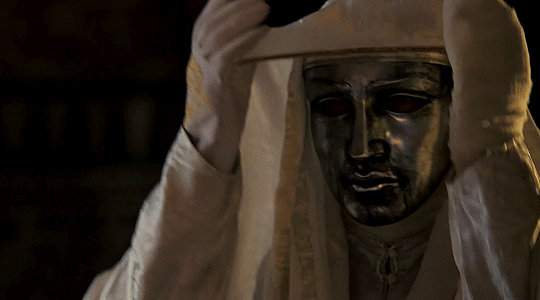
A/N: So, here we are. I could not resist this mysterious and tormented king's charm. His silky voice makes me dream! These are some headcanons I've collected off the top of my head. The Reader is implied to be female and married to Baldwin IV. Please, do feel free to hit my inbox to ramble about our king because I'm literally dying of pining and yearning.
tags: female!reader x baldwin iv of jerusalem (from kingdom of heaven); reader is married to baldwin iv of jerusalem; fluff; slight angst towards the end
wc: 1150k
reccomended songs to listen to while reading: "Summertime Sadness" by Hildegard von Blingin; "Right Here" by Ashes Remain; "Blood, Sweat, Tears" by BTS (orchestral version)
"Many are the tales of the King Baldwin IV of Jerusalem and of his Queen. Despite the varying accounts of their deeds, each one of them agrees on one aspect: the King of Jerusalem loved his Queen dearly, and the world is richer for it".
Baldwin IV is mysterious, intense, valiant, noble and utterly devoted to you, his Queen. But what does this devotion look like?
Firstly, he would believe in you like no other and would always be ready to give you his best advice whenever the weight of your responsibility becomes too much. Foreign rulers would soon learn of your qualities - there would hardly be a piece of correspondence where the King of Jerusalem does not praise the intellect and insight of his dear wife. He would glance at you from time to time, while you both work at your desks sharing the burden of paperwork, silently thanking God for having sent him not only a beautiful, but reliable life companion as well.
He values your opinions greatly and has the utmost regard for your views on political, military and state matters. Disagreements happen, yet your overall values are aligned, which is why Baldwin understands your vision and where your point comes from. During the discussions regarding complex decisions, he would let you speak and explain, then he would offer his honest thoughts on the matter, should he see another, different way from yours.
Playing chess is a favorite way of spending quality time together in your chambers, away from the chaos of the court. If you know how to play and are proficient at it, he would delight in the thrill of challenge, as he would finally have found a true equal. If you do not know how to play, he would teach you with patience, taking pride whenever you make an unexpected and astute move. He would be such a nerd while he explains the rules to you and would be delighted to see how your mind works when devising a plan.
"Congratulations, dove. You have a checkmate."

I can also see Baldwin taking you on long rides, if his health allows it. He would sweetly check the reins and saddle on your horse before mounting on his steed and leading you away to enjoy the cool early morning breeze, before the heat of Jerusalem becomes too sweltering. You would have a nice and secluded spot to enjoy and to pretend that you are a couple of young lovers without responsibilities and crowns weighing on your heads.
Your presence brings him safety and comfort, which is what would convince him to remove his mask when he is alone with you and the physicians. He would especially love to rest his head on your la as you gently caress his curls while the physicians tend to his skin. It is a sacred moment. He does not know how he went so long without your presence during this delicate time. Speaking softly to each other, you would distract him from the pain with talk of your hometown, fairy tales from your culture, or even simply reflecting on a happening of that day. On these occasions, you learn how to best take care of him, watching the physician tend to his arm while you tend to the other, delicately dabbing the cloth over his wounded skin. Baldwin feels so protected and safe in your presence. He thinks you are God’s greatest gift to him.
Now, jealousy. Baldwin knows he boasts the honor of having an exquisite flower such as yourself to call his own. As do powerful men and courtiers from distant lands. Many covet your loveliness as one would a precious gem. Should one of these foolish people try to take you from him or even stare at you for too long to be considered proper, they would be met with a pure force to be reckoned with. Should a knight’s eye linger on you for too long, he would be quick to put him in place in his signature glacial, elegant way. Before long, everyone learns not to disrespect the Queen consort of Jerusalem.
“Perhaps you would have understood my point, had you not been so insolently ogling my wife”.
He takes out his whip.
“On your knees. You will pay for insulting the Queen”.

He would protect you with his life. He swore to protect Jerusalem and, as its Queen, that includes first of all you. Should a courtier doubt your devotion and mistake it for thirst for power, or should he learn of an orchestrated attempt on your life, he would waste no time in employing his best forces in your service to defend you.
His enemies and templars alike fear him, yet with you he is as gentle as the morning breeze that gently caresses Jerusalem. This powerful king who makes armies tremble and kingdoms shake is the same person who holds and kisses your hand (when in public, bringing your fingers to the lips of his mask), who silently admires your loveliness from afar and sighs to himself, who longs for your warmth after a tiring day.
He would write you letters. Lots of them. And not always when he is away. Maybe he just liked the way the sun reflected in your eyes that morning. Or maybe when you helped a servant, he was moved by your kindness. Your every action inspires him, so much so that he has to let out his thoughts on paper. You have a pretty wooden box brimming with delicate papers penned by Baldwin in your honor. He is not only the King of Jerusalem, but also the king of pining, of yearning. Even when he has you near, he yearns for you.
I love to imagine him letting you accompany him to battle. He would love it too, in theory. You make him so strong, the both of you would be quite the sight, meeting your enemies head on, as one, donning your best armors. Yet, at the same time I cannot imagine him resting easy knowing that a loose arrow, a desperate soldier seeking glory for killing the Queen of Jerusalem, or fatigue and sickness could take you from him. It pains his heart to be parted from you, yet he cannot risk your safety. Instead, Baldwin would trust you with ruling the kingdom. He has absolute faith in your intelligence, willpower and cleverness, especially after all he has taught you about running the realm. He longs for you every second he’s away from Jerusalem, yet his heart is at peace knowing his kingdom is in the most capable hands.
When he feels that his time on this Earth is nearing his end, he calls for his most trusted advisors, including Balian and Tiberias. He would ask them, almost begging, to protect you always, at all costs, when he is no longer there to do so. Balian and Tiberias would exchange a quick glance to each other, vowing to respect their King’s wish until the very end.
“Protect her. Please.”
“Always, my Lord”.

Poems, songs and stories would be written in honor of your love even centuries after your passing. Many tales would speak of Baldwin IV of Jerusalem and his Queen. Different pieces of art, such as paintings and ballads, would inspire people from all over the world to find a love as devoted and unshakable as yours. Until the very end.
All in all, to love Baldwin means knowing your time together is limited. As is the time of all creatures on Earth. He would beg you to go on after his passing, to live for him. He shall wait for you and protect you from above. Until the very end.
#king baldwin x reader#king baldwin iv x reader#baldwin iv x reader#baldwin x reader#kingdom of heaven#king baldwin#king baldwin iv#koh#kingdom of heaven imagine#kingdom of heaven imagines#mywriting
366 notes
·
View notes